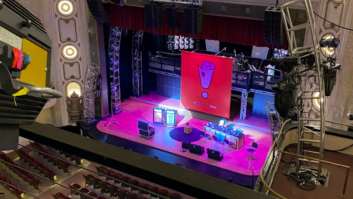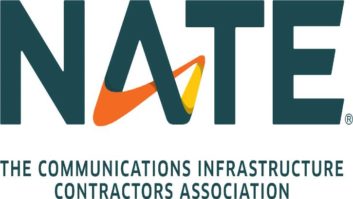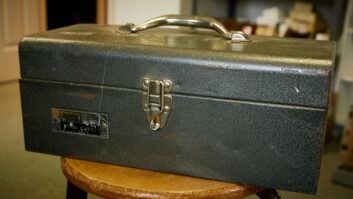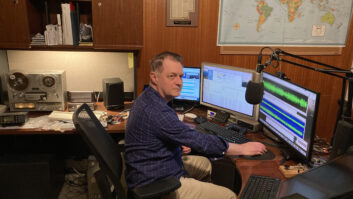The following interview appeared in the recent Radio World eBook “AM Translators: What’s Next?”

Bayard “Bud” Walters is owner/president of The Cromwell Group, licensee of 17 FM stations, six AMs and 23 translators. The company filed the original “Mattoon waiver” and subsequent “Tell City waiver,” which played roles in industry debate over use and regulations of FM translators.
Radio World: Why is an FM translator a good investment for an AM broadcaster?
Walters: Disregard whether people are listening to AMs; the reality is that local businesses do not think that anybody listens to AM. Therefore it’s harder to do business on Main Street as an AM-only station, particularly if you have FM competitors. In a small town, the FM translator probably covers the whole town and makes you more acceptable to local advertisers.
[Also there’s] the interference from electrical stuff on AM that you don’t get on FM.
When [people] think in terms of “AM revitalization,” they’re not really talking about saving the AM band, in my view. They’re talking about continuing the idea of local service in many smaller communities that had failing AM stations. The addition of the FM translator gave a new lease on life to local radio service.
RW: Are AM broadcasters finding success financially thanks to this strategy?
Walters: Oh yes. Absolutely. I had a gentleman from Athens, Tenn., who has an AM, I met him at a Tennessee Association of Broadcasters convention three years ago. He was really struggling. He now has an FM translator; and he told me at the Tennessee Broadcasters meeting last month that it was just like manna from heaven. People are listening. He’s got a good signal. He’s competing. He’s happy to be in the business again.

Bud Walters.
RW: You have a station in Nashville called “The Ville.” What can we learn from your experience with that?
Walters: It is repeating an FM HD, it’s not being fed by an AM; but The Ville is a rhythm & blues and soul station serving the minority community. We had been doing gospel and it was not working. It had a presence, but the audience was up and down, and our business was not as strong as it could be.
I was in a class last year called Leadership Music here in Nashville. In that class was a fellow named Shannon Sanders, a black Grammy Award-winning producer and Dove Award-winning artist. He slipped me a note across the table that said, “Bud, what Nashville really needs is a rhythm & blues and soul station, and I want to do it.”
A month later, we switched the station to “The Ville.” We just had a feature article on the “The Ville” in The Nashville Tennessean.
It’s a translator. It’s serving a community. Here it is three months old, and it has 70,000 listeners a week.
RW: How is putting on a translator different, from a manager/owner perspective, from building a station from scratch?
Walters: If it is going to repeat your existing programming, it’s hardly anything at all. It’s a matter of getting the construction permit; you want to find a tower that is as tall as possible and get the antenna as high up as you can; you want to be sure you’re selecting a frequency that is not interfering with somebody else but also that somebody else won’t interfere with you.
It is possible to get a legal grant but still have interference from a full-power station. You want to listen on the dial before you apply and make sure you’ve got [a frequency] that’s relatively clean.
Once you’ve got the construction permit, it is a simple matter of putting up an FM antenna, some coax [and] transmitter.
Depending on how you’re going to get the signal from your studio to the transmitter site, it can all be done for less than $15,000. You can spend more, but you can do it for $15,000.
That takes your AM from being something non-competitive and not really acceptable in the local business community to something that can be competitive for listeners and compete for advertisers; and you’ve got a viable business again.
RW: Are there questions an operator needs to know to talk intelligently with consultants or legal advisors?
Walters: I think, at this point, most people know. Most of the legal advisors and consultants have been through this enough that they already know. The best thing I can say is, honestly, if you are an AM operator and you do not now have a translator and you have a chance to get one, don’t analyze. Just do it. There’s no analysis to be done.
RW: Thoughts about interference complaints — how a distant primary can shut down a translator based on one or two complaints?
Walters: Localism should prevail.
You don’t usually find local listeners listening to a distant signal, except maybe in an emergency. For commercial operators of large stations far away, they usually don’t depend on those distant places for advertising. If somebody’s in a small town and they can provide a local service, and more people would be listening to them than would be listening to the distant signal, we’ve got to find out how to work that out.
I have circumstances myself where I have a 100,000-watt FM and it is now being infringed upon by a translator in Paducah, Ky. That’s way up in Kentucky. I’m not really getting advertising from up there; I’d like the Paducah guy to pull his signal in some, but the truth is, Paducah’s not part of my market.
An AM operator or an existing FM operator, before they build [a translator], needs to be sure to the best of their ability that they’re not going to cause interference to somebody else.
RW: Anything else we should be thinking about?
Walters: Our company filed the original Mattoon waiver. That set up the circumstance for many people to move translators. The idea had already been approved that AMs could have translators, but the Mattoon waiver made it possible for folks to move more translators to their AM stations.
Later on, we applied for a waiver that we called the Tell City waiver. While it was turned down, it was appealed by the Multicultural Media, Telecom and Internet Council and the NAB. The commission showed interest in trying to help AMs, in particular Commissioner Pai before he was the chairman.
It’s a credit to the FCC staff that they found a way to do the 250-mile thing last year, which in the end almost came out to be what we were requesting as a Tell City waiver.
AM operators in small towns were given the opportunity to compete again and to serve their communities. This is a big, big deal. It does involve the question about interference; we’re going to have to find a way to resolve that, because this gets down to making sure the public is served.
In the end there’s absolutely no question that AM stations that have translators are doing a better job of serving their communities, and they are much more viable than ever before.
If I was talking about what the commission could do [further]: Just that they enforce the interference rules as it relates to electrical devices, fluorescent lights. … These little connectors that go in your car to charge your cellphone cause a tremendous amount of interference to the AM and FM car radio. That’s a whole area of compliance where manufacturers could be held accountable.












